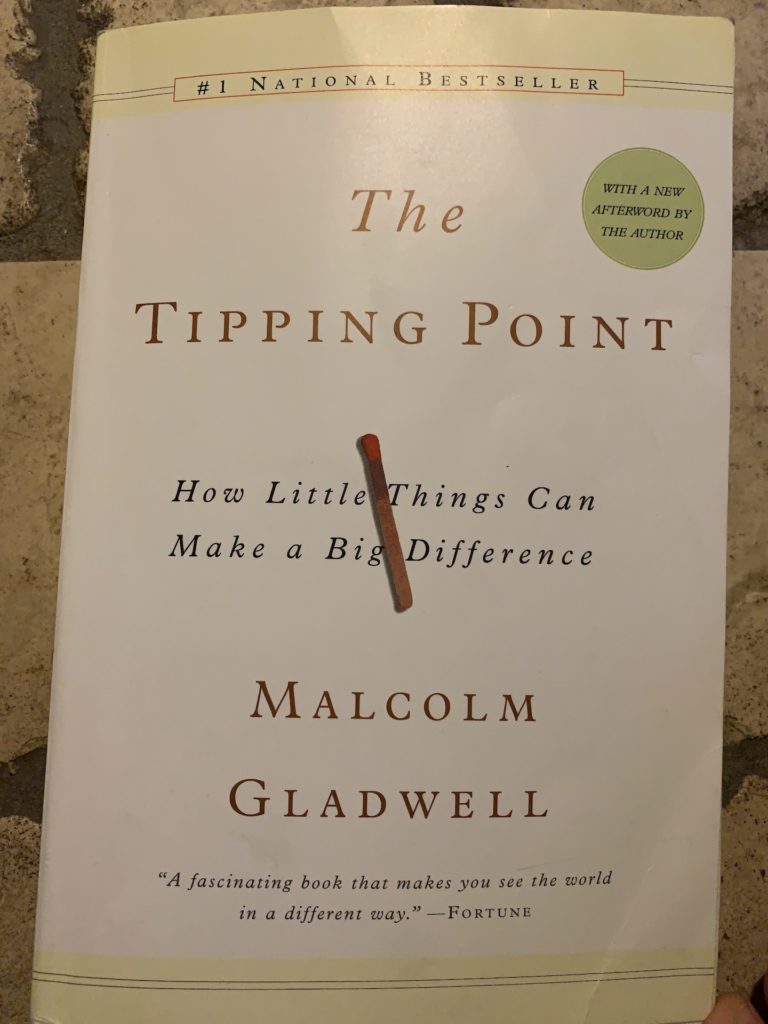
The Tipping Point, by Malcolm Gladwell, is a fascinating book. It was first mentioned to me by a coworker and I decided to read it. After reading the Tipping Point, I then went ahead and read also two other Gladwell’s book, Blink and Outliers. I loved all of them.
Gladwell is a staff writer for The New Yorker magazine, and he has been studying and writing about the nature of trends for years.
This book tries to synthesize and popularize scientific work in epidemiology, psychology, and sociology, and to apply it to social behaviors and cultural trends.
According to Gladwell, the Tipping Point is the “magic moment when an idea, trend or social behavior crosses a threshold, tips, and spreads like wildfire.” The book is a study of human behavior and what makes people accept and spread the knowledge about particular causes and products.
His thesis is that “the best way to understand the emergence of fashion trends, the ebb and flows of crime waves, or, for that matter, the transformation of unknown books into bestsellers, or the rise of teenage smoking, or the phenomena of word of mouth, or any number of the other mysterious changes that mark everyday life is to think of them as epidemics. Ideas and products and messages and behavior spread just like viruses do”.
The book uses several compelling examples to make its case, including the rise of Hush Puppies and the fall of New York’s crime rate. These two examples and many others share three common characteristics: they are contagious, little changes had big effects, and they did happen suddenly, not gradually.
The Tipping Point is organized around the three rules of epidemics.
The first rule is The Law of the Few or that “the success of any kind of social epidemic is heavily dependent on the involvement of people with a particular and rare set of social gifts.”
The Tipping Point goes on by describing three types of people that Gladwell calls Connectors, Mavens and Salesmen.
Gladwell introduces his discussion about these types of people by using the fascinating example of Paul Revere’s ride at the beginning of the American Revolution. Probably – he writes – “the most famous historical example of word of mouth”
But who are these people?
According to Gladwell, Connectors are those individuals who know a lot of people, who have an instinctive and natural ability to make friends and connect. What is even more important, connectors don’t only know many people, but they also live in many different worlds and subcultures: they know many different types of people.
In order to start an epidemic, however, you also need Mavens. While the Connectors connect us to other people, the Mavens connect us to new information, they are information specialists. The word “Mavens comes from the Yiddish, and it means ones who accumulate knowledge”.
These people are obsessed with knowing and understanding a particular product or market. They do not only accumulate knowledge about a particular subject, but they also feel the need to help others to learn and take advantage of that knowledge. “To be a Maven is to be a teacher. But it is also, even more emphatically, to be a student. Mavens are really information brokers, sharing and trading what they know.”
The last group are the Salesmen, who have “the skills to persuade us when we are unconvinced of what we are hearing, and they are as critical to the tipping of word-of-mouth epidemics as the other two groups.”
The Law of the Few, in short, states that social epidemics are started when these special people get involved, for whatever reason they do.
The second rule of epidemics is The Stickiness Factor or in other words, “Is your idea memorable enough to make people take action?”
To describe stickiness the author compares two TV shows for children: Sesame Street and Blue’s Clues. Sesame Street’s legacy, according toGladwell, is that if you paid careful attention to the structure and format of your material, you could enhance stickiness”. Sometimes, however, the line between acceptance and hostility towards a particular product or trend is very narrow. An idea that catches on may only be moderately different than one that does not.
The third rule is The Power of Context. “Epidemics are sensitive to the conditions and circumstances of the times and places in which they occur”. To illustrate this principle Gladwell relates the example of crime-ridden New York City. In the early 1990s, public officials were successful in reducing crime, by first identifying small but reachable goals to change the contexts. Simple things such as refusing to let subway cars return to service each night without cleaning or arresting gate jumpers in stations, proved to be key in creating a tipping point in fighting crime.
At the end of the book there are a few case studies. Overall the Tipping Point is a great read!


I read them all a few years ago. You also need to read David and Goliath
I will read it soon. I have a long list 🙂